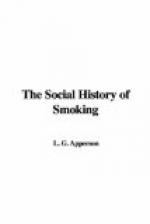Smoking was soon as common in the country as in London. On Wednesday, April 16, 1621, in the course of a debate in the House of Commons, Sir William Stroud, who seems to have been a worthy disciple of that tobacco-hater, King James I, moved that he “would have tobacco banished wholly out of the kingdom, and that it may not be brought in from any part, nor used amongst us”; and Sir Grey Palmes said “that if tobacco be not banished, it will overthrow 100,000 men in England, for now it is so common that he hath seen ploughmen take it as they are at plough.” Perhaps this terrible picture of a ploughman smoking as he followed his lonely furrow did not impress the House so much as Sir Grey evidently thought it would; at all events, tobacco was not banished.
Peers and squires and parsons and peasants alike smoked. The parson of Thornton, in Buckinghamshire, was so devoted to tobacco that when his supply of the weed ran short, he is said to have cut up the bell-ropes and smoked them! This is dated about 1630. In the well-known description of the famous country squire, Mr. Hastings, who was remarkable for keeping up old customs in the early years of the seventeenth century, we read of how his hall tables were littered with hawks’ hoods, bells, old hats with their crowns thrust in, full of pheasants’ eggs; tables, dice, cards, and store of tobacco-pipes.
Sir Francis Vere, in the account of his services by sea and land which he wrote about 1606, mentions that on an expedition to the Azores in 1597, the Earl of Essex, waiting for news of the enemy at St. Michael, “called for tobacco ... and so on horseback, with those Noblemen and Gentlemen on foot beside him, took tobacco, whilst I was telling his Lordship of the men I had sent forth, and orders I had given.” Presently came the sound of guns, which “made his Lordship cast his pipe from him, and listen to the shooting.”
Another famous nobleman, Lord Herbert of Cherbury—
All-virtuous Herbert! on
whose every part
Truth might spend all her
voice, fame all her art!—
was a smoker, as we know from a very curious passage in his well-known autobiography. He appears to have smoked not so much for pleasure as for supposed reasons of health. “It is well known,” he wrote, “to those that wait in my chamber, that the shirts, waistcoats, and other garments I wear next my body, are sweet, beyond what either can easily be believed, or hath been observed in any else, which sweetness also was found to be in my breath above others, before I used to take tobacco, which towards my latter time I was forced to take against certain rheums and catarrhs that trouble me, which yet did not taint my breath for any long time.” The autobiography was written about 1645, so as Lord Herbert did not smoke till towards the latter part of his life—he died in 1648—he clearly was not one of those who took to tobacco in the first enthusiasm for the new indulgence.




